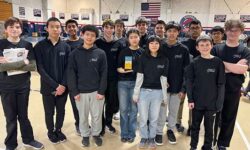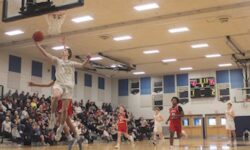By Maddie Gerber
Hometown Weekly Intern
It’s Thursday night and per usual, my friends and I are debating weekend plans in our group chat.
Except nothing about this night is usual, nothing about this weekend will be usual, and our weekend plans certainly won’t be usual.
Normally, the debate is about which restaurant to go to, whose house to meet up at, or which sports game to attend. But tonight, due to coronavirus, none of these options are on the table. In the end, we decide to set up a movie night where we can all watch Netflix together using an extension on our laptops called “Netflix Party.” It’s as close as we can get to being together, but somehow, it still isn’t enough.
As coronavirus continues to spread and we are becoming more and more cautious, social interactions are shrinking exponentially, especially for Needham High students, who are accustomed to interacting with their peers almost all the time. As a junior at NHS, I can vouch for the fact that it has been an extremely hard transition to go from seeing my friends almost every day - whether it be at school, sports practices, or just meeting up for brunch - to not seeing them at all. It feels strange, and honestly, it feels really lonely.
However, during this time, NHS students have been utilizing technology to hold on to these connections in any way they can, whether it be through Facetime, gaming consoles, or simply texting.
In order to stay connected with his friends, NHS student Will Haney has set up an 8 p.m. meeting every night to play the game Call of Duty through gaming systems such as XBox and PS4. “No matter what we have done during the day, at 8, a bunch of people always come play,” Haney explained, noting that it’s been a really great way to help him stay social while staying home.
Similarly, NHS student Jason Gershman has also found video games to be a helpful way to stay connected. “I don’t really play them that much,” Gershman admitted, “but now I’ve been doing it a lot more. Sometimes, I don’t even play, but I’ll just join so I can talk with my friends.”
Both boys, however, noted that playing these games isn’t the same as seeing their friends in real life. “I miss face-to-face communication” Gershman said. “I miss the human affection that you just can’t get through a screen.”
Haney also noted that he misses simple things, like eating with other people. “That used to be a center of a lot of social interaction for me,” Haney laughed, “I used to look forward to eating donuts with my homeroom or going to Cafe Fresh for lunch.” Even though Haney has still been supporting local businesses, he says that it’s not the same. “I used to go and say hi to the employees. Now that everything has been cut down to the essentials, you barely talk anymore.”
NHS student Nicole Allen has also noticed a social void that technology struggles to fill. “Interactions are just different now,” Allen said, noting that she’s been relying on multiplayer games, such as Words With Friends; Zoom calls; and “Netflix Party” to stay connected. “You can’t have large groups, you can’t wave hi to someone in a hallway, and even in Zoom classes, you can’t have one-on-one conversations with your peers.” One of the biggest things that Allen misses are friendships that she formed in the classroom. “There were just these people that I talked to in school that I never talked to over the phone. I didn’t really realize how much these little interactions meant to me until now.”
One social interaction that is impossible to replicate through a screen is touch. Although neither Allen nor I consider ourselves to be “touchy-feely” people, we’ve both realized that we miss being able to touch one another as a way to stay connected. “I miss high-fives” Allen laughed, “I never realized how many high-fives I used to give, but I miss doing that.”
It’s going to be a long time before we can high-five again.
In the meantime, technology is our biggest asset. Although it's hard not to feel lonely right now, it’s important to know that we are not alone, and to utilize the technology we have to stay connected as a community when we need each other the most. Despite all the obstacles that we are facing, NHS students are resourceful and resilient.
We are finding ways to stay social while social distancing.





















